You are here: Foswiki>Dmi Web>WinterSchool2018>WinterSchool2018MemoryFormationDigitalIdentityPolitics (06 Feb 2018, XiaofengDai)Edit Attach
-- XiaofengDai - 30 Jan 2018
 2. a) Extracting significant Twitter handles of the users of the Alt Left and Antifa, and compare. We used TCAT to extract a list of the Twitter users who mention “alt left” and another of those who mention “antifa”. In Excel we sorted them from most to least mentions and took the fifty users who came first.
b) We also look at those mostly mentioned accounts to discover who are the terms’ users. We rearranged the result by sorting the top 50 of each group according to followers and looked at the thirty users with the largest following.
c) Using Gephi to show the social network of “alt left” and “antifa” users.
3. Lexis Nexis Newsdesk query: depiction of news sources using ‘alt left’ (e.g., Fox news).
4. We created two stream graphs that show the usage of the word “antifa” and “alt-left” across 2017 in different subreddits. We used manual coding to identify pro-trump, anti-trump and ‘neither’ subreddits.
Semantic evolution of ‘alt left’ as well as ‘antifa’ in Reddit, 2017. We queried the terms across all subreddits to see which subreddits that contribute to understandings of ‘antifa’ and ‘alt left’.
2. a) Extracting significant Twitter handles of the users of the Alt Left and Antifa, and compare. We used TCAT to extract a list of the Twitter users who mention “alt left” and another of those who mention “antifa”. In Excel we sorted them from most to least mentions and took the fifty users who came first.
b) We also look at those mostly mentioned accounts to discover who are the terms’ users. We rearranged the result by sorting the top 50 of each group according to followers and looked at the thirty users with the largest following.
c) Using Gephi to show the social network of “alt left” and “antifa” users.
3. Lexis Nexis Newsdesk query: depiction of news sources using ‘alt left’ (e.g., Fox news).
4. We created two stream graphs that show the usage of the word “antifa” and “alt-left” across 2017 in different subreddits. We used manual coding to identify pro-trump, anti-trump and ‘neither’ subreddits.
Semantic evolution of ‘alt left’ as well as ‘antifa’ in Reddit, 2017. We queried the terms across all subreddits to see which subreddits that contribute to understandings of ‘antifa’ and ‘alt left’.
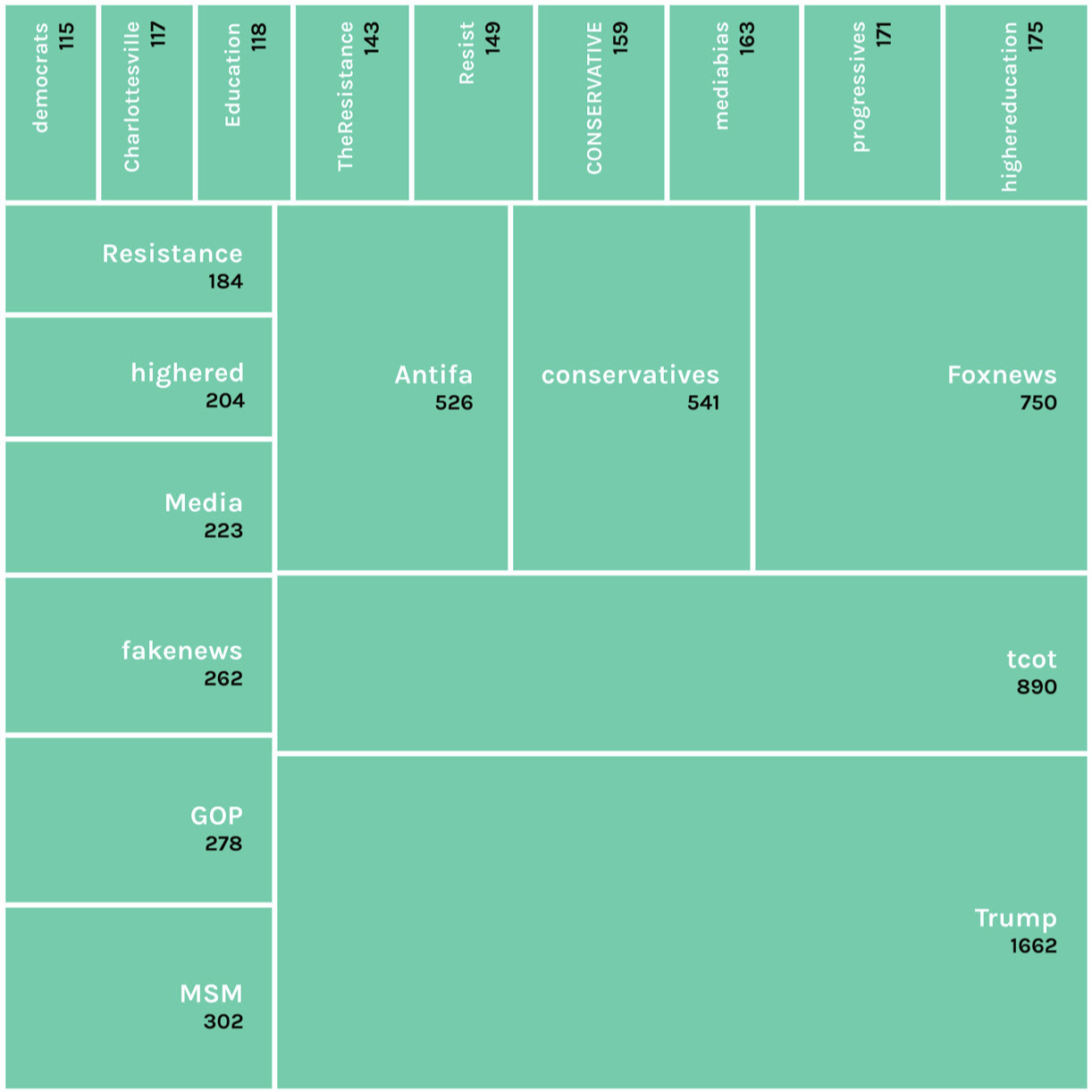
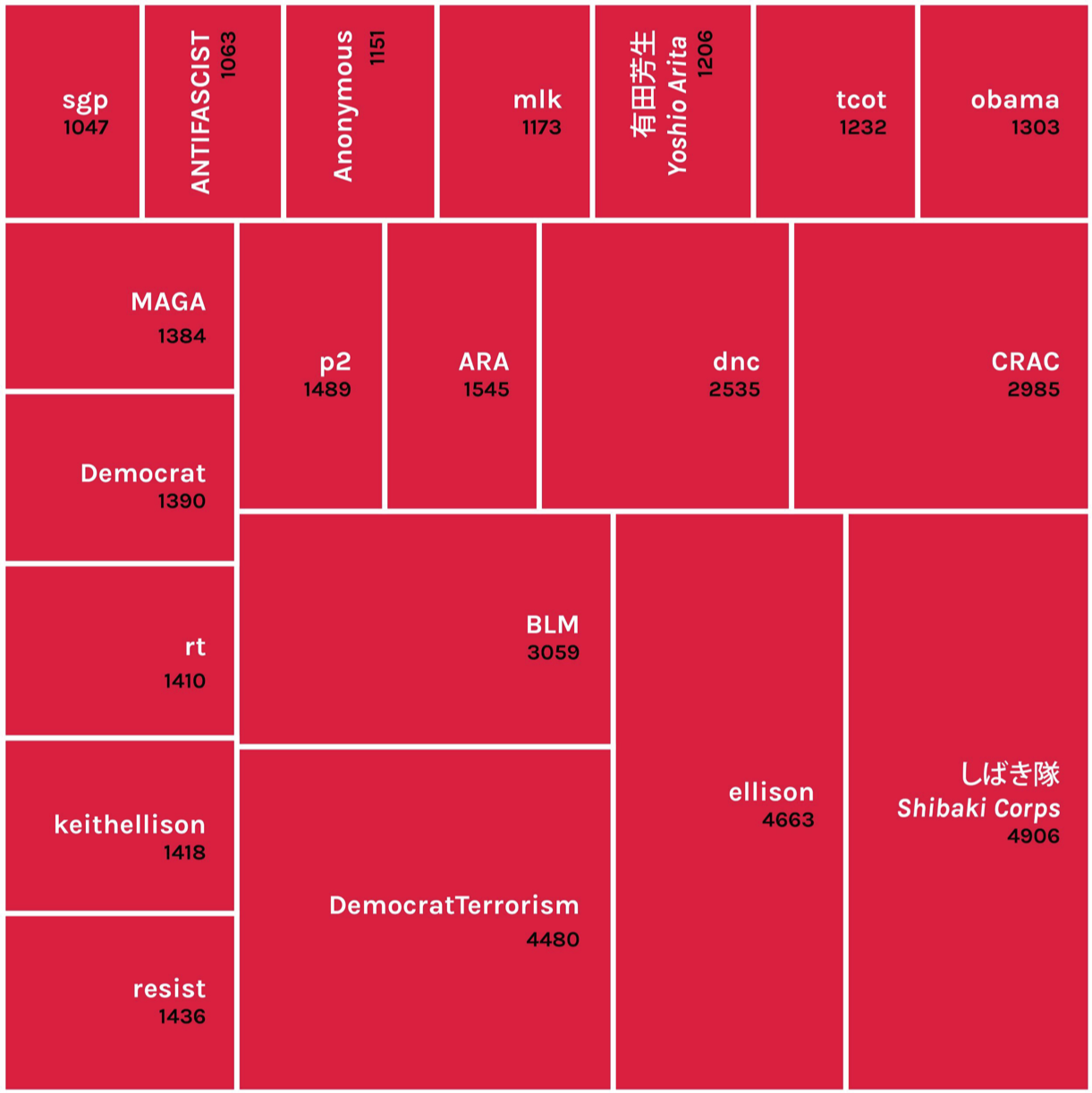 figure 1: top 20 hashtags in Alt Left (the green one) and Antifa (the red one) spaces.
There is little to no overlap between Alt Left and Antifa (in th top 20 hashtags referenced in the two spaces). From the hashtags, note that the discourse of the Alt Left on Twitter is situated in more mainstream political dialogues (GOP, Trump, progressive etc). However, the discursive environment of Antifa is much more complex. The discourse of the Antifa is driven by leftist organisation (collective, corps, groups) in the US and Japan as well as digital culture, where there is a discursive war between tcot sympathisers (conservatives) and p2 (progressives two). There is a considerable amount of leftist-referential hashtags, e.g. ARA, Shibaki Corps, CRAC — the latter two hashtags show, the Antifa discursive environment extends to points outside the bounds of the US.
figure 1: top 20 hashtags in Alt Left (the green one) and Antifa (the red one) spaces.
There is little to no overlap between Alt Left and Antifa (in th top 20 hashtags referenced in the two spaces). From the hashtags, note that the discourse of the Alt Left on Twitter is situated in more mainstream political dialogues (GOP, Trump, progressive etc). However, the discursive environment of Antifa is much more complex. The discourse of the Antifa is driven by leftist organisation (collective, corps, groups) in the US and Japan as well as digital culture, where there is a discursive war between tcot sympathisers (conservatives) and p2 (progressives two). There is a considerable amount of leftist-referential hashtags, e.g. ARA, Shibaki Corps, CRAC — the latter two hashtags show, the Antifa discursive environment extends to points outside the bounds of the US.
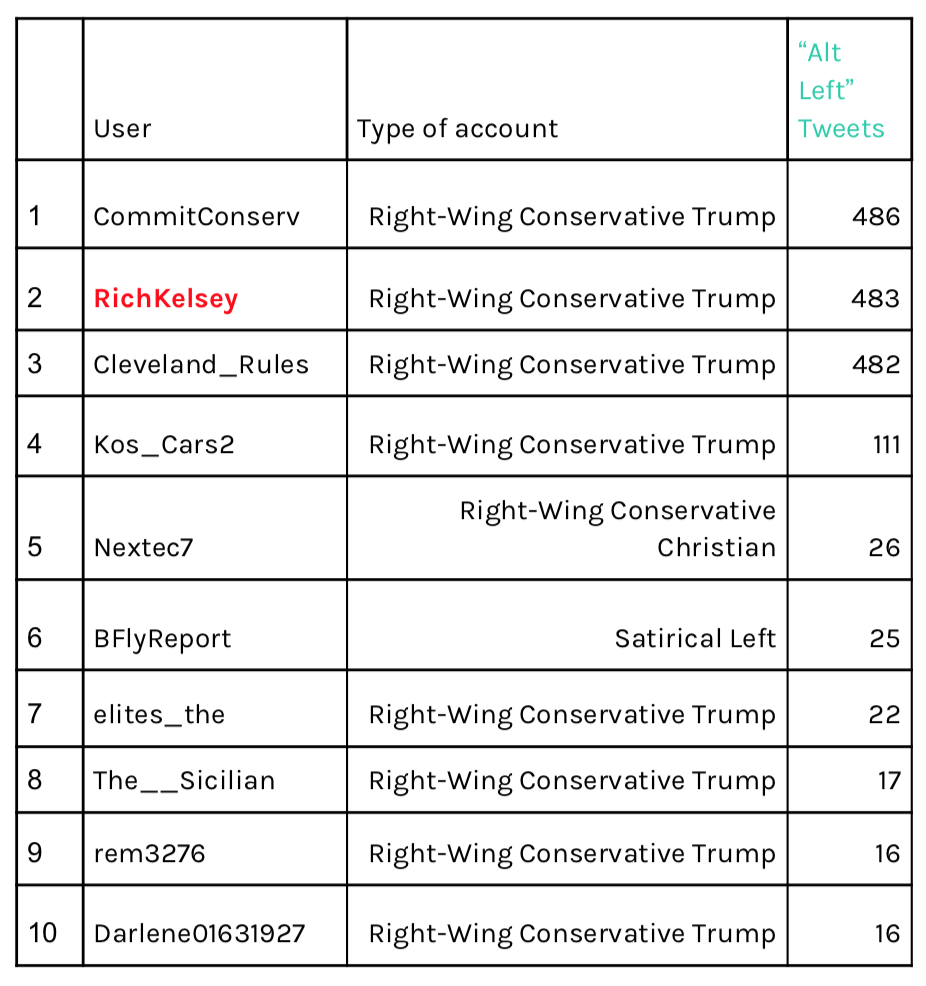
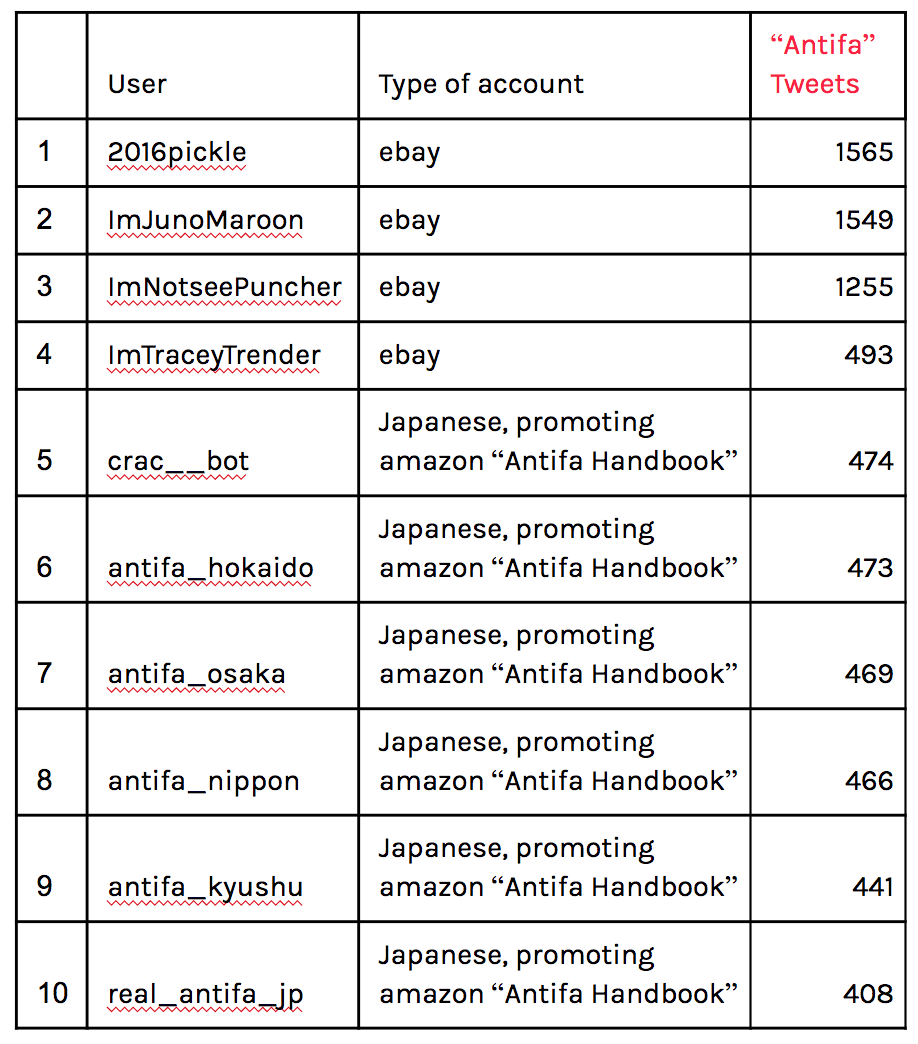 figure 2: top 10 users of #altleft and #antifa.
We discovered that the term Alt Left is mostly used by right-wing, conservative, Trump supporting Americans, while some European alt right is also present. When it comes to “antifa,” we found a lot of bots, Ebay sellers that sell “anti-fascist” stickers etc., Japanese antifa accounts of which it is hard to establish if they are real and clearly fake American Antifa accounts.
figure 2: top 10 users of #altleft and #antifa.
We discovered that the term Alt Left is mostly used by right-wing, conservative, Trump supporting Americans, while some European alt right is also present. When it comes to “antifa,” we found a lot of bots, Ebay sellers that sell “anti-fascist” stickers etc., Japanese antifa accounts of which it is hard to establish if they are real and clearly fake American Antifa accounts.
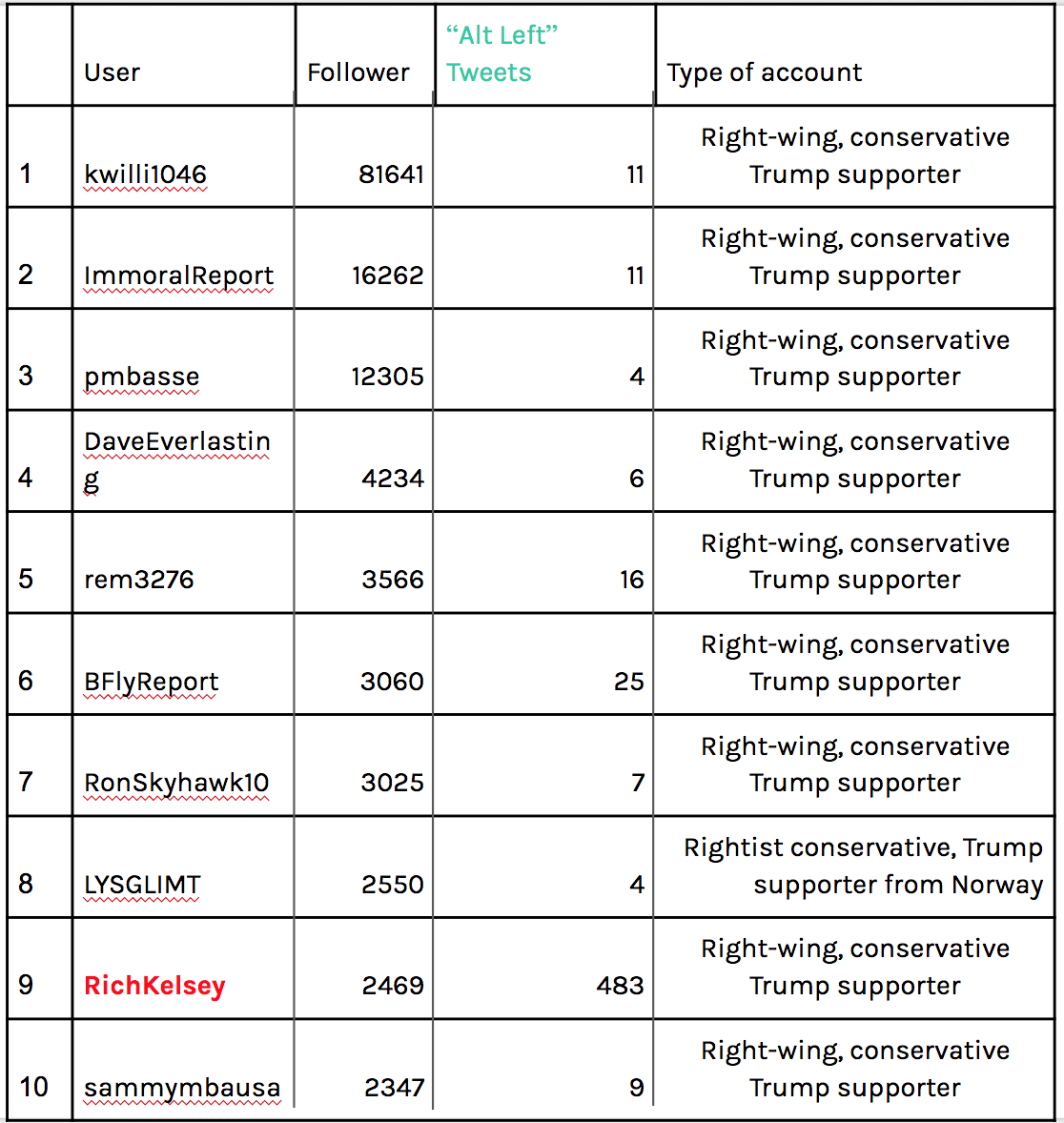
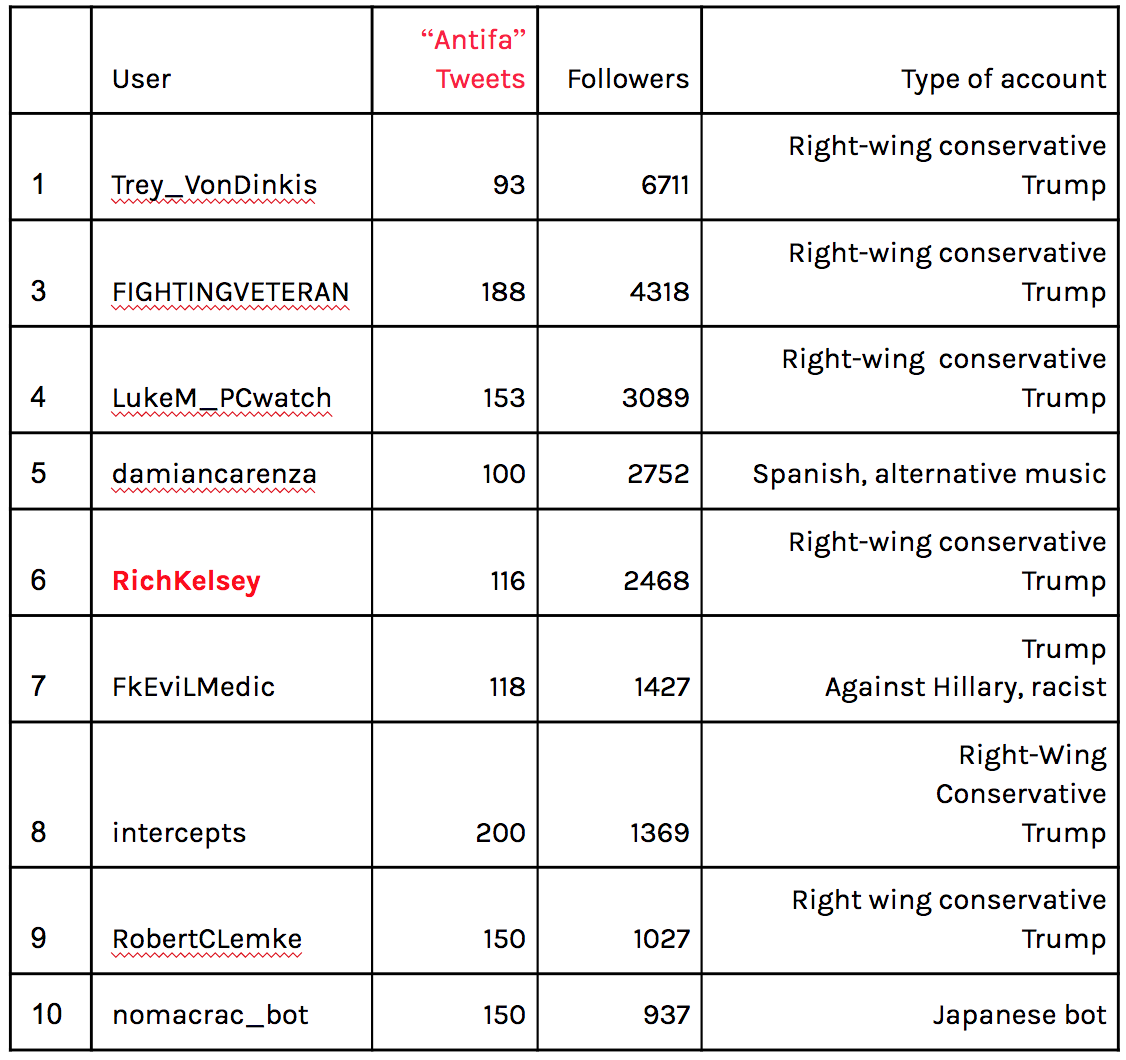 figure 3. mostly mentioned users in #altleft and #antifa spaces.
We found that the “most influential” users of both terms were right-wing, conservative, Trump supporting Americans or fake Antifa/leftist accounts. Subsequently, we also found some overlapping results: kiwilli1046, the most influential in the term “alt left” is also present in the “antifa” list, only a little further along the line (he used the term “antifa” 25 times). Furthermore, the accounts of RichKelsey (editor of the website CommittedConservative) and Cleveland_Rules are present in both Top 30s.
Twitter accounts that talk about “antifa” and “alt left” are right-wing, conservative, Trump supporting Americans. We found one left-wing account, supporting antifa: @HalalKitty6
figure 3. mostly mentioned users in #altleft and #antifa spaces.
We found that the “most influential” users of both terms were right-wing, conservative, Trump supporting Americans or fake Antifa/leftist accounts. Subsequently, we also found some overlapping results: kiwilli1046, the most influential in the term “alt left” is also present in the “antifa” list, only a little further along the line (he used the term “antifa” 25 times). Furthermore, the accounts of RichKelsey (editor of the website CommittedConservative) and Cleveland_Rules are present in both Top 30s.
Twitter accounts that talk about “antifa” and “alt left” are right-wing, conservative, Trump supporting Americans. We found one left-wing account, supporting antifa: @HalalKitty6
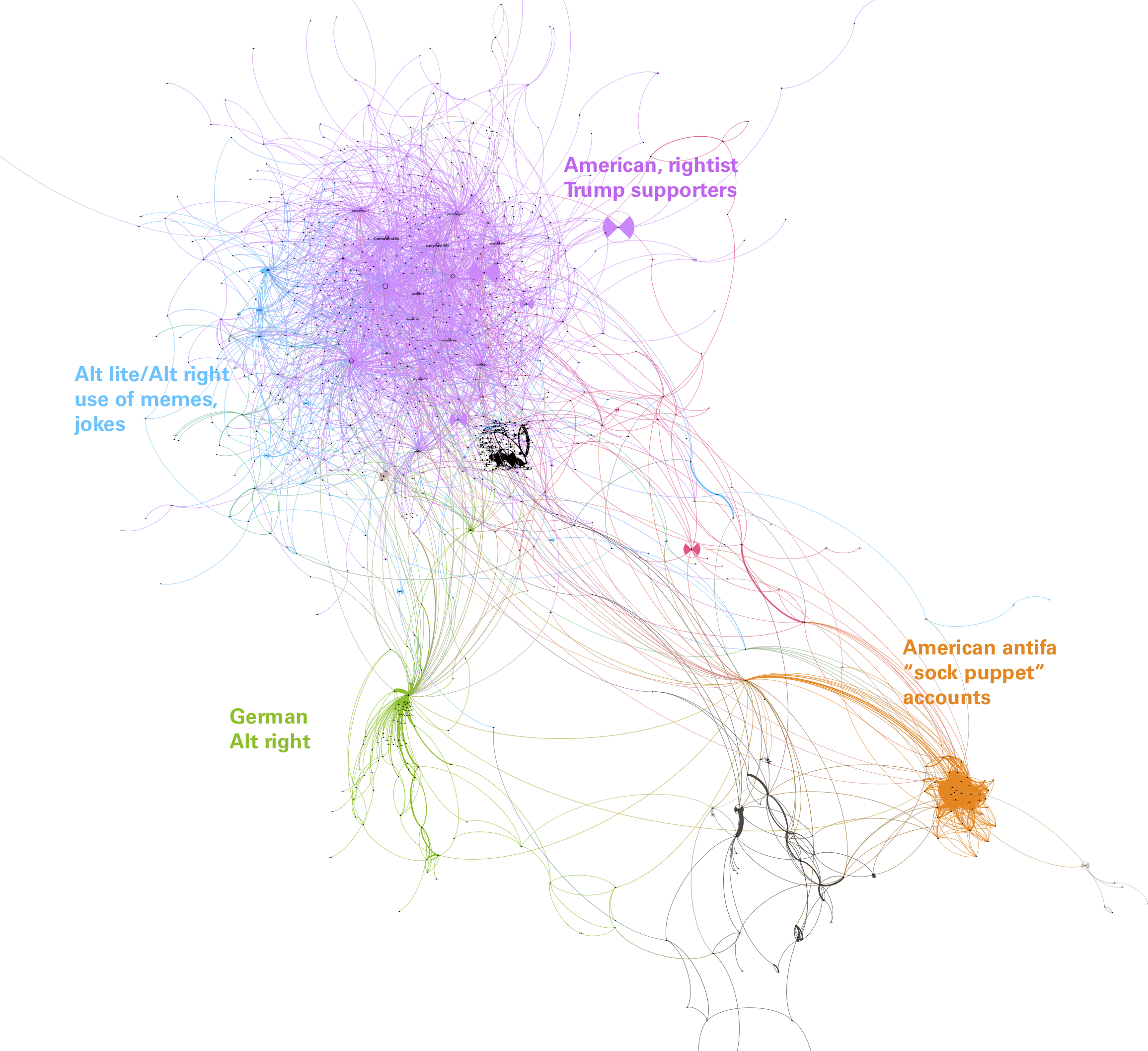 figure 4: users networks of #antifa.
The dominant voices of #antifa space are not Antifa itself.
figure 4: users networks of #antifa.
The dominant voices of #antifa space are not Antifa itself.
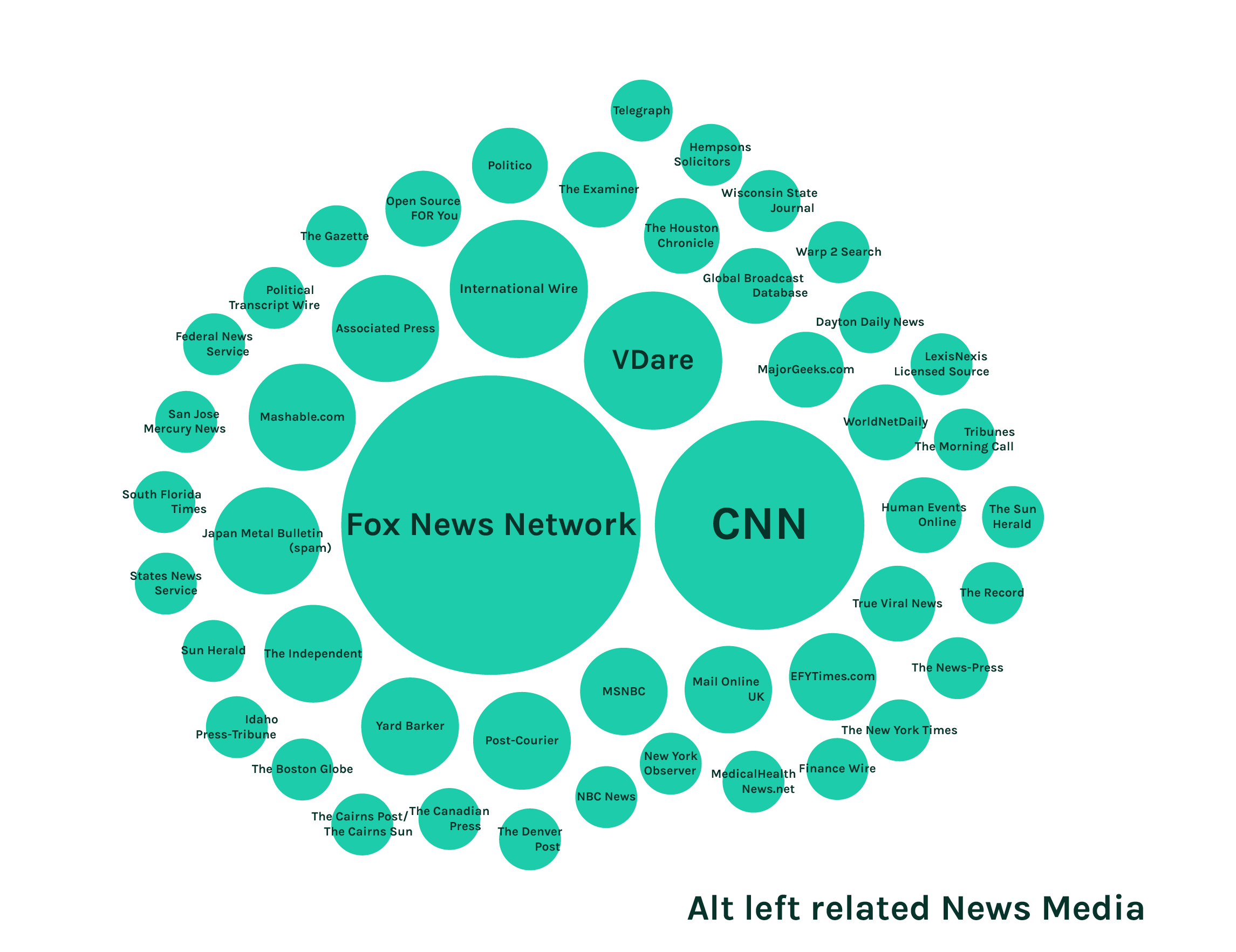
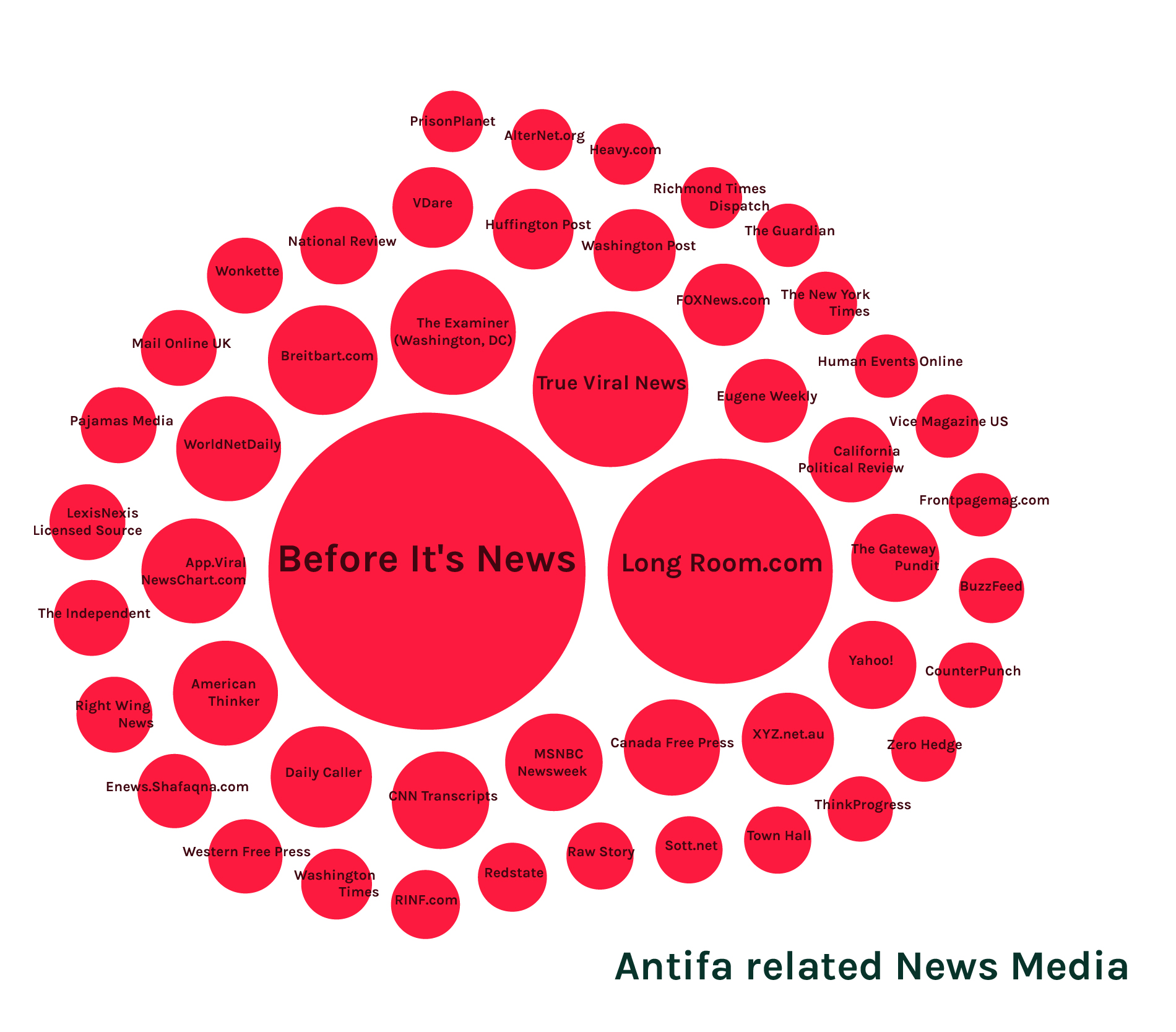 figure 5: Alt Left and Antifa related news media.
“Alt Left” has mainstreamed in the sense that it is mentioned in the news most significantly by Fox News and CNN, but is bursty, appearing after Charlottesville in August 2016 (on Fox News) and in a short period thereafter on CNN. Since its relative decline on mainstream news, “Alt Left” has been most frequently on Vdare.com, the fringe news site describing itself as the “premier news outlet for patriotic immigration reform.” Antifa is dominated by fringe news sites (conspiracy, tabloid conservative, predominantly right-of-center political). Alt left has mainstreamed as antifa has marginalised, and both are animated by a broad spectrum of the right.
figure 5: Alt Left and Antifa related news media.
“Alt Left” has mainstreamed in the sense that it is mentioned in the news most significantly by Fox News and CNN, but is bursty, appearing after Charlottesville in August 2016 (on Fox News) and in a short period thereafter on CNN. Since its relative decline on mainstream news, “Alt Left” has been most frequently on Vdare.com, the fringe news site describing itself as the “premier news outlet for patriotic immigration reform.” Antifa is dominated by fringe news sites (conspiracy, tabloid conservative, predominantly right-of-center political). Alt left has mainstreamed as antifa has marginalised, and both are animated by a broad spectrum of the right.
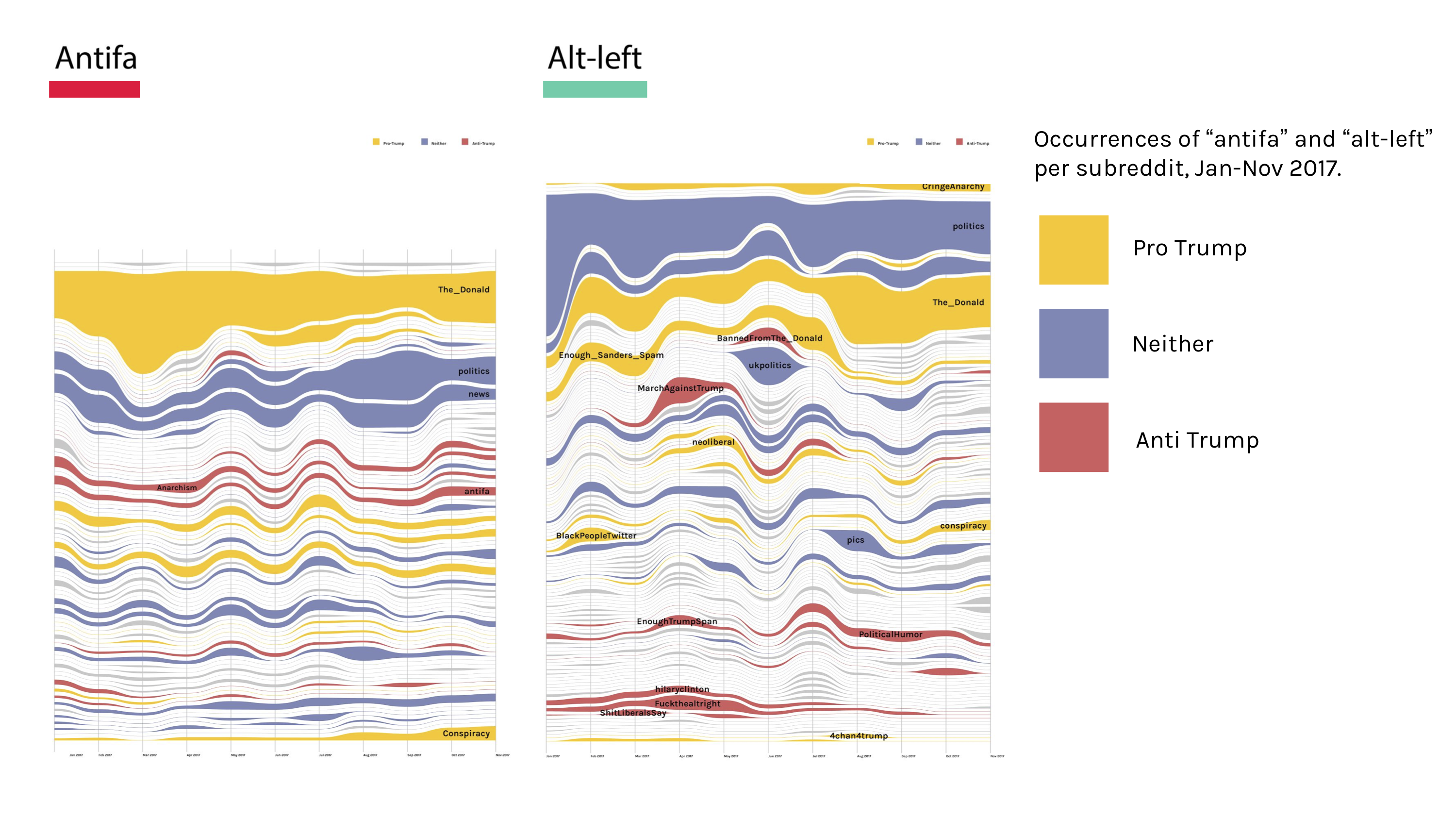 figure 6: Occurrences of Alt Left and Antifa per subreddit (Jan- Nov, 2017).
Concerning its emergence, the Alt Left is most significantly associated with pro-Trump subreddits, and increasingly so. Since Charlottesville (August 2017), The_Donald uses "Alt Left" far more often than "Antifa" (although NOT in absolute values). Across the subreddits, before Charlottesville Rally (in August 2017), the term Alt Left largely referred to game culture.
figure 6: Occurrences of Alt Left and Antifa per subreddit (Jan- Nov, 2017).
Concerning its emergence, the Alt Left is most significantly associated with pro-Trump subreddits, and increasingly so. Since Charlottesville (August 2017), The_Donald uses "Alt Left" far more often than "Antifa" (although NOT in absolute values). Across the subreddits, before Charlottesville Rally (in August 2017), the term Alt Left largely referred to game culture.
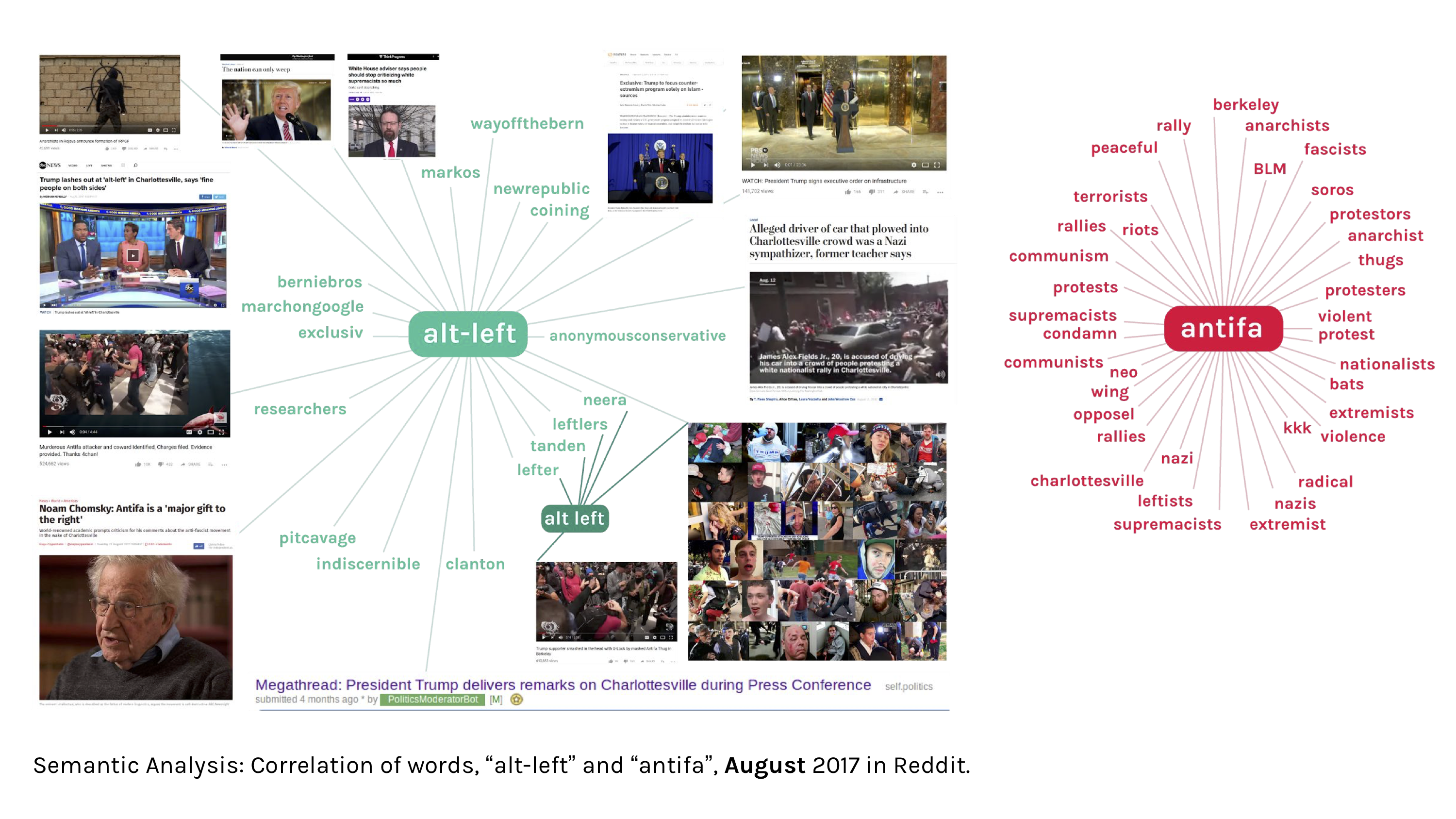 figure 7: Correlation of words, Alt Left and Antifa, August 2017, Reddit.
Then we created three other visualisations for the pre-, during and post-Charlottesville online discourse, showing word correlations within the Antifa and Alt Left spaces in these three different time frames. Something strange happen when it comes in August 2017, we found the words correlated to Alt Left, as well as Antifa, were not only textual words, but also many tokens for videos and images. This enabled us to identify a trend that sees antifa and alt left as violent describing those through images and words with negative connotation. Furthermore we see how the terms alt left and antifa begun being associated only after August.
Semantically, the Alt Left hardly existed in subreddits until appearing after Charlottesville, when it has become increasingly associated with violence. (Alt Left are most often used in titles, be it news, YouTube videos and images, e.g., on imgur).
figure 7: Correlation of words, Alt Left and Antifa, August 2017, Reddit.
Then we created three other visualisations for the pre-, during and post-Charlottesville online discourse, showing word correlations within the Antifa and Alt Left spaces in these three different time frames. Something strange happen when it comes in August 2017, we found the words correlated to Alt Left, as well as Antifa, were not only textual words, but also many tokens for videos and images. This enabled us to identify a trend that sees antifa and alt left as violent describing those through images and words with negative connotation. Furthermore we see how the terms alt left and antifa begun being associated only after August.
Semantically, the Alt Left hardly existed in subreddits until appearing after Charlottesville, when it has become increasingly associated with violence. (Alt Left are most often used in titles, be it news, YouTube videos and images, e.g., on imgur).
Alt Left and Antifa
Team Members
Richard Rogers (University of Amsterdam), Umberto Boschi (Utrecht University), Xiaofeng Dai (Designer-researcher-artist), Marissa Klaver (University of Amsterdam), Sterre Meijer (University of Amsterdam), Samantha North (University of Bath), Ryan Tsapatsaris (University of Pennsylvania). DensityDesign team: Elena Aversa, Giulia Corona. Presentation slides: http://bit.ly/2FvvR5uContent
Summary of Key Findings
The discourses of ‘Alt Left’ and Antifa spaces are distinctive on Twitter, in which the Alt Left is situated in more mainstream political dialogues. In the mainstream news analysis, the notion of Alt Left resonates significantly on Fox News, however much it has been in relative decline since the Charlottesville incidents (in August 2016). With respect to its most significant associations, we found (in Reddit) that the Alt Left substantively is most significantly associated with violence. As for its publics or users, we found, on Twitter as well as on Reddit, that the term is mainly employed by pro-Trump supporters. The finding provides a strong indication that the Alt Left as such is faux.1. Introduction
Richard Spencer said that Trump’s victory was the first step, the first stage towards identity politics. There are a minority of digital activists, a highly engaged and active group who perform the role of co-producers of party communication (Koc-Michalska and Lilleker, 2017). Reddit demonstrates its centrality as a platform for the construction of political communities; in 2017 President Trump has defined Twitter as a platform for diplomacy, threatening to undo the world with each tweet he posts. Understanding digital politics requires studying both its supply side (what parties and candidates propose) and its demand side (what citizens do online) (Vaccari, 2013). Alt Right communities promote their political ideology vigorously. At the same time, it seems they are seeking to create balance through an equal and opposite identity. The term Alt Left began to be used by the online media in 2016 before it slowly migrated to more mainstream conservative voices. A Reddit-based researcher (Squirrel, 2017) reported that the term has been spread-up after the “Unite the right” rally in Aug 2017.2. Initial data sets
Using Twitter data (from 22 December 2017 to 10 January 2018) in the first instance the project compares #altleft space and #antifa space. Using Lexis Nexis Newsdesk for querying “Alt Left” and “Antifa” in mainstream news. Using Google BigQuery for Reddit analysis. Querying for occurrences of the term “Alt Left" and “Antifa” across different subreddits in different timeframes (each month from 2015 to 2017), as well as the co-occurrences with other words in 2017.3. Research questions
1. Does the ‘Alt Left’ exist? As a term, is it equivalent to Antifa? 2. Could the ‘Alt Left’ be considered an Alt Right construct? Who uses the term Alt Left? 3. Is the ‘Alt Left’ as a notion mainstreaming? Has it stabilised as a term by mainstream news? 4. How did the ‘Alt Left’ emerge? How to characterise the Alt Left's identity (semantically)?4. Methodology
1. Making list of most frequent hashtags and co-hashtags. Making subset of tweet containing “alt left” in Antifa space, make hashtag list. The output is showed side by side.5. Findings
1. Concerning the existence of Alt Left

 figure 1: top 20 hashtags in Alt Left (the green one) and Antifa (the red one) spaces.
There is little to no overlap between Alt Left and Antifa (in th top 20 hashtags referenced in the two spaces). From the hashtags, note that the discourse of the Alt Left on Twitter is situated in more mainstream political dialogues (GOP, Trump, progressive etc). However, the discursive environment of Antifa is much more complex. The discourse of the Antifa is driven by leftist organisation (collective, corps, groups) in the US and Japan as well as digital culture, where there is a discursive war between tcot sympathisers (conservatives) and p2 (progressives two). There is a considerable amount of leftist-referential hashtags, e.g. ARA, Shibaki Corps, CRAC — the latter two hashtags show, the Antifa discursive environment extends to points outside the bounds of the US.
figure 1: top 20 hashtags in Alt Left (the green one) and Antifa (the red one) spaces.
There is little to no overlap between Alt Left and Antifa (in th top 20 hashtags referenced in the two spaces). From the hashtags, note that the discourse of the Alt Left on Twitter is situated in more mainstream political dialogues (GOP, Trump, progressive etc). However, the discursive environment of Antifa is much more complex. The discourse of the Antifa is driven by leftist organisation (collective, corps, groups) in the US and Japan as well as digital culture, where there is a discursive war between tcot sympathisers (conservatives) and p2 (progressives two). There is a considerable amount of leftist-referential hashtags, e.g. ARA, Shibaki Corps, CRAC — the latter two hashtags show, the Antifa discursive environment extends to points outside the bounds of the US.
2. As the construct of Alt Right or not

 figure 2: top 10 users of #altleft and #antifa.
We discovered that the term Alt Left is mostly used by right-wing, conservative, Trump supporting Americans, while some European alt right is also present. When it comes to “antifa,” we found a lot of bots, Ebay sellers that sell “anti-fascist” stickers etc., Japanese antifa accounts of which it is hard to establish if they are real and clearly fake American Antifa accounts.
figure 2: top 10 users of #altleft and #antifa.
We discovered that the term Alt Left is mostly used by right-wing, conservative, Trump supporting Americans, while some European alt right is also present. When it comes to “antifa,” we found a lot of bots, Ebay sellers that sell “anti-fascist” stickers etc., Japanese antifa accounts of which it is hard to establish if they are real and clearly fake American Antifa accounts.
 figure 3. mostly mentioned users in #altleft and #antifa spaces.
We found that the “most influential” users of both terms were right-wing, conservative, Trump supporting Americans or fake Antifa/leftist accounts. Subsequently, we also found some overlapping results: kiwilli1046, the most influential in the term “alt left” is also present in the “antifa” list, only a little further along the line (he used the term “antifa” 25 times). Furthermore, the accounts of RichKelsey (editor of the website CommittedConservative) and Cleveland_Rules are present in both Top 30s.
Twitter accounts that talk about “antifa” and “alt left” are right-wing, conservative, Trump supporting Americans. We found one left-wing account, supporting antifa: @HalalKitty6
figure 3. mostly mentioned users in #altleft and #antifa spaces.
We found that the “most influential” users of both terms were right-wing, conservative, Trump supporting Americans or fake Antifa/leftist accounts. Subsequently, we also found some overlapping results: kiwilli1046, the most influential in the term “alt left” is also present in the “antifa” list, only a little further along the line (he used the term “antifa” 25 times). Furthermore, the accounts of RichKelsey (editor of the website CommittedConservative) and Cleveland_Rules are present in both Top 30s.
Twitter accounts that talk about “antifa” and “alt left” are right-wing, conservative, Trump supporting Americans. We found one left-wing account, supporting antifa: @HalalKitty6
 figure 4: users networks of #antifa.
The dominant voices of #antifa space are not Antifa itself.
figure 4: users networks of #antifa.
The dominant voices of #antifa space are not Antifa itself.
3. Mainstreaming or not

 figure 5: Alt Left and Antifa related news media.
“Alt Left” has mainstreamed in the sense that it is mentioned in the news most significantly by Fox News and CNN, but is bursty, appearing after Charlottesville in August 2016 (on Fox News) and in a short period thereafter on CNN. Since its relative decline on mainstream news, “Alt Left” has been most frequently on Vdare.com, the fringe news site describing itself as the “premier news outlet for patriotic immigration reform.” Antifa is dominated by fringe news sites (conspiracy, tabloid conservative, predominantly right-of-center political). Alt left has mainstreamed as antifa has marginalised, and both are animated by a broad spectrum of the right.
figure 5: Alt Left and Antifa related news media.
“Alt Left” has mainstreamed in the sense that it is mentioned in the news most significantly by Fox News and CNN, but is bursty, appearing after Charlottesville in August 2016 (on Fox News) and in a short period thereafter on CNN. Since its relative decline on mainstream news, “Alt Left” has been most frequently on Vdare.com, the fringe news site describing itself as the “premier news outlet for patriotic immigration reform.” Antifa is dominated by fringe news sites (conspiracy, tabloid conservative, predominantly right-of-center political). Alt left has mainstreamed as antifa has marginalised, and both are animated by a broad spectrum of the right.
4. The emergence and characterisation of Alt Left's identity
 figure 6: Occurrences of Alt Left and Antifa per subreddit (Jan- Nov, 2017).
Concerning its emergence, the Alt Left is most significantly associated with pro-Trump subreddits, and increasingly so. Since Charlottesville (August 2017), The_Donald uses "Alt Left" far more often than "Antifa" (although NOT in absolute values). Across the subreddits, before Charlottesville Rally (in August 2017), the term Alt Left largely referred to game culture.
figure 6: Occurrences of Alt Left and Antifa per subreddit (Jan- Nov, 2017).
Concerning its emergence, the Alt Left is most significantly associated with pro-Trump subreddits, and increasingly so. Since Charlottesville (August 2017), The_Donald uses "Alt Left" far more often than "Antifa" (although NOT in absolute values). Across the subreddits, before Charlottesville Rally (in August 2017), the term Alt Left largely referred to game culture.
 figure 7: Correlation of words, Alt Left and Antifa, August 2017, Reddit.
Then we created three other visualisations for the pre-, during and post-Charlottesville online discourse, showing word correlations within the Antifa and Alt Left spaces in these three different time frames. Something strange happen when it comes in August 2017, we found the words correlated to Alt Left, as well as Antifa, were not only textual words, but also many tokens for videos and images. This enabled us to identify a trend that sees antifa and alt left as violent describing those through images and words with negative connotation. Furthermore we see how the terms alt left and antifa begun being associated only after August.
Semantically, the Alt Left hardly existed in subreddits until appearing after Charlottesville, when it has become increasingly associated with violence. (Alt Left are most often used in titles, be it news, YouTube videos and images, e.g., on imgur).
figure 7: Correlation of words, Alt Left and Antifa, August 2017, Reddit.
Then we created three other visualisations for the pre-, during and post-Charlottesville online discourse, showing word correlations within the Antifa and Alt Left spaces in these three different time frames. Something strange happen when it comes in August 2017, we found the words correlated to Alt Left, as well as Antifa, were not only textual words, but also many tokens for videos and images. This enabled us to identify a trend that sees antifa and alt left as violent describing those through images and words with negative connotation. Furthermore we see how the terms alt left and antifa begun being associated only after August.
Semantically, the Alt Left hardly existed in subreddits until appearing after Charlottesville, when it has become increasingly associated with violence. (Alt Left are most often used in titles, be it news, YouTube videos and images, e.g., on imgur).
6. Discussion
The particular case in question concerned the ‘Alt Left’, which is a term exists not according to Antifa, but describes the loose movement of anti-fascists and others opposed to the rising ‘Alt Right’, especially in the US but also in Europe. The discourses of Alt Left and Antifa spaces are distinctive on Twitter, in which the Alt Left is situated in more mainstream political dialogues. In the mainstream news analysis, we found that the notion of Alt Left resonates significantly on Fox News, however much it has been in relative decline since the Charlottesville incidents (in August 2017) when the Alt Right organised one of its most notorious ‘free speech’ rallies. With respect to its most significant associations, we found (in Reddit) that the Alt Left substantively is most significantly associated with violence. As for its publics or users, we found, on Twitter as well as on Reddit, that the term is mainly employed by pro-Trump supporters. The finding provides a strong indication that the Alt Left as such is ‘fake’ or faux, as we described it. In a sense pro-Trump supporters have succeeded in creating a fictional anti-public, the Alt Left, associating it with violence, as a form of moral equivalency to the Alt Right after Charlottesville, and mainstreaming it in the news.7. Conclusion
Alt Left—a political space, the locus of collective memory. The conception of thoughtlessness (Arendt, 1958) exposes itself as a risk in the post-truth age, where the veracity of political speech is undermined to such an extent that it becomes increasingly difficult to discern both the doer of political action and the content of their action. Underlying the post-truth anxiety is the question of memory formation in a community’s sense. The Alt Left, as a faux public, shines back upon the term "post-truth"—not only from the perspective of investigative discourse, but also, because it is a digital site or 'monument' where memory is mobilised. We would argue that memory is about associated narratives of an entity—an entity told through its narratives or being experienced collectively will entangle in the symbolic embodiment of collective memory; words and deeds (or speech and action) are the elements, but also substantial outcome, of the narratives of collective memory. Collective memory as the (efficient) agent that brings a community’s identity into being; in other words, an 'imagined' community’s sense of collective identity, such as the creation of the Alt Left by Trump supporters—“a kind of organised remembrance” (Arendt, 1958: 198) serving as a fictional anti-public construct and the intended othering to the Alt Right—is the locus triggering ones’ collective remembrance and imagination, associating with violent identities of ‘the past’. In this case study, the social stability of a community’s identity and its equivalent recognition in terms of morality are concerned. This, provides a framework/sense what the common narratives are, bringing ‘the past’ collective memory to light. Between ‘the past’ and ‘the present’ that is the (temporal) continuity of reconstruction. Into identifying the digital formation of ‘the present’ collective memory, the further research will be acting as a ‘wayback’ machine and going into those processes, which is to say that two facets need to be addressed: the agency of (DIGITAL) collective memory per se; the mobilisation by the agency of collective memory.8. References
Koc-Michalska, K., Lilleker, D. (2017). “Digital Politics: Mobilization, Engagement, and Participation”. Political Communication. 34.2: 1-5. Squirrel, T. (2017). “How the alt-right made the alt-left a thing”. Quartz. Link Vaccari, C. (2013). Digital Politics in Western Democracies: A Comparative Study.Edit | Attach | Print version | History: r6 < r5 < r4 < r3 | Backlinks | View wiki text | Edit wiki text | More topic actions
Topic revision: r6 - 06 Feb 2018, XiaofengDai
 Copyright © by the contributing authors. All material on this collaboration platform is the property of the contributing authors.
Copyright © by the contributing authors. All material on this collaboration platform is the property of the contributing authors. Ideas, requests, problems regarding Foswiki? Send feedback


